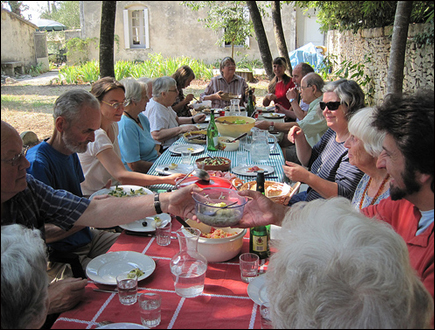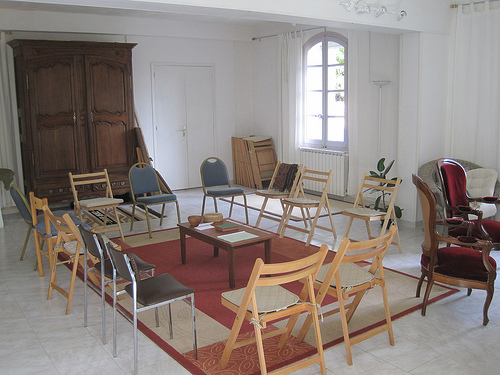
During their prolonged and often off-the-beaten-track travels around the world, Judy and David Kashoff settled down for five months at the Quaker Center in Congénies, a village in France’s Languedoc region between Nimes and Montpellier. In this article, Judy explores both the beauty of their stay and the unique history of Quakers in France. David’s accompanying photos can be seen at Congénies Quaker House: Peace, Friends and Dogs. There are about 350,000 Quakers worldwide, with some 500 in France. About 15 attend worship each week at Congénies.
Bright orange passion fruits hang from vines that cover most of a stucco-over stone wall and creep over the edges of an old wooden shutter. The shutter’s blue paint is peeling away with characteristic charm. A plum tree is so laden with fruit that the stone walkway has to be swept daily so as not to track a purple mess into the building. The scent of lavender fills the air as we stroll along the garden path with Jacqueline, who volunteers to do the gardening here.
“It’s planned that way,” says Jacqueline. “Your legs are meant to disturb the lavender, releasing its scent so you may enjoy it when walking by.”
In the same way, white flowers are planted so that they stand out in the evening, almost glowing, for people to admire while having their evening meal at Maison Quaker, or Quaker Center, in the village of Congénies, France.
We arrived here at dusk, when the blooms seem their brightest, and immediately knew this was a place to call home for a while.
We’d arrived after several days of travel from Tunisia; flights had been late and long, luggage lost, trains delayed or canceled. A long, hot train ride finally brought us to Nimes, where we retrieved the most important of our lost luggage: our bicycles. We then rode through the noise and traffic of the commercial belt surrounding the city until we broke away into the countryside via the Voie Verte.
The Voie Verte is a greenway built on an old railway line, where trains used to travel between villages, filling tank cars with grape juice at each stop. The tracks have since been paved over and the resulting greenway now attracts cyclists, rollerbladers and walkers. The instant we left the road to ride its smooth and quiet surface we were transported to another world.
We’d come to France to settle down for several months (in the end, five) in Congénies after two months of cycling in Africa, in countries that were dry, dusty, hot, and sometimes uncomfortable. Suddenly, now, we were surrounded by the beauty, climate, landscape, and well-being that is the south of France: pastoral rolling hills, endless rows of grapevines and olive trees, fields bright with sunflowers, ancient stone villages tucked into the folds of gentle hills, the Mediterranean sensed a few hills away.
The road leading to Congénies is lined with plane trees whose pale green and grey mottled trunks stand out in the dusky light against the dark stone walls that line the street. Their leaves, at the height of their summer greenness, provide a canopy of welcome leading to the gate of Maison Quaker.
We were greeted with warmth by contemporary members of the Quaker community here, and over a garden table filled with food and wine we heard stories of ancient Friends.

Friends or Quakers are the names given to members of the Religious Society of Friends. Friends have simple beliefs: there is no creed. They believe there is “that of God in everyone” and there are no rules or demands placed on its followers to hold a particular vision of who that God is. Quakers worship in silence; anyone who feels moved to speak may do so.
Yet Quakers do have strong principles; values that lead members of this faith to action: Quakers work for social justice, equality and peace. Quakers refuse to participate in war, believing violence is never justified.
Quakerism started in England in the 1600s, but unbeknownst to those 17th-century Friends, there was a group of people in the south of France that held virtually the same beliefs. They were known as les Couflaïres—the Inspires or the Inspired Ones—and had lived in the region around Congénies even before George Fox founded Quakerism in England. These two groups, each of whose basic tenants of faith revolved around honesty and non-violence, found each other in the most remarkable way: through piracy.
For the most part, Quakers, holding firm to their beliefs, stayed out of the turmoil of the American-British war for American independence. But France saw this as an ideal opportunity to chip away at their old rival by supporting the revolutionaries. This in turn prompted the British monarch to encourage ships to attack and rob French vessels as they traveled across the Atlantic. Privateering could be quite lucrative, and many English shipping outfits took advantage of the crown’s invitation.
Three of the boats whose owners profited by this situation were co-owned by an English Quaker, Joseph Fox (no relationship to George Fox), who, not being a hands-on partner, had no idea that he was a partner in crime. On discovery, his Quaker principals led him to react in a way that was markedly different from what might be considered normal business practice under the circumstances: he decided to make restitution.
In 1785 he dispatched his son Edward to Paris to place a full page advertisement in the Gazette de France. In it, he explained that Quakers do not support war or theft and expressed his regret over the buccaneering of his family-owned ships. Furthermore, and most unusual, he offered compensation to the victims. Claims were made and paid, one of them to a boat owner in the town of Sète, a port town located on the Mediterranean, not far from the village of Congénies.
When this news reached the local population, members of the Couflaïres were impressed to learn there were others with a philosophy so close to their own. They wrote to Edward to claim not compensation, but friendship. The two groups joined, and the first Quaker Meeting in France was formed in 1788.

The meeting house in Congénies, the only building in France designed specifically as a Friends meeting house, was built in 1822. It flourished as a house of worship for 60 years, always with friendship between the British and the French. Conscription, particularly during the Franco-Prussian War of 1870, took its toll on the community, resulting in the emigration of young men since they were pacifist. The departure of the young men led more women to marry out of the faith. With too few Quakers left the building was sold in 1907. It served as a hospital during the First World War and was occupied by German troops during the Second.
The journey to retrieve the building’s heritage began when it was purchased by English Quakers as a holiday home after WWII. The 21st century now brings Maison Quaker full circle and back into the hands of the Religious Society of Friends. The building has been renovated, but the strong stone walls look the same as they did nearly 200 years ago. Ancient, heavy wooden doors open to let light into a building where people from far and wide can come to visit. French is the language spoken here, although most congregants also speak English, and will do so readily if you wish.
In its rebirth, Maison Quaker has become more than a house of worship: it is now a center where Quakers and non-Quakers meet for friendship, study, and relaxation, for joyful meals and quiet meditation.
Whether an individual, a family, or a couple, Quaker or not, anyone can book a room at Centre Quaker Congénies for a few days or a few weeks and enjoy the countryside, just as we did. You can smell the lavender as you walk to the table in the garden, where you can enjoy a breakfast of home-made plum jam on bread fresh and warm from the bakery a few steps away. And while you linger over coffee, you can look into the old graveyard, the only Quaker graveyard in France, its simple, worn stones shaded with cypress trees. It’s a peaceful place built by people whose love of peace transcended violence, piracy, and their nations’ differences.
Practical information
Centre Quaker, Congénies is located in the Languedoc region of southern France, 22 km/14mi southwest of Nimes and 37km/23mi northeast of Montpellier, the grey zone between southeast and southwest France. Congénies is an old village with a bakery, a quality grocery shop, and a population of about 1500. There are several excellent restaurants nearby.
Within a few kilometers are two market towns, one of them, Sommieres, is a lovely medieval town on an emerald green river. Day trips can be made to places such as the Pont du Gard, the Natural Reserve of the Camargue, and Provencal towns such Avignon, St. Remy and Arles, or in the other direction Montpellier and its nearby beaches. Travelers in search of nature and sports can cycle on the voie verte and go horseback riding and bird watching in the Camargue. There are also many good hiking trails around.
Contact: centre.quaker.congenies@gmail.com, or call 33 – (0) 4 66 71 25 93, or 33 (0) 4 66 80 26 42 to book a room in either French or English.
© 2010, Judy Kashoff
See David Kashoff’s photos of Congénies by clicking here.


If you spent time at La Residence Quaker in Congenies, could you contact me. We are going to be Amis Residents next year and would like to talk to you.